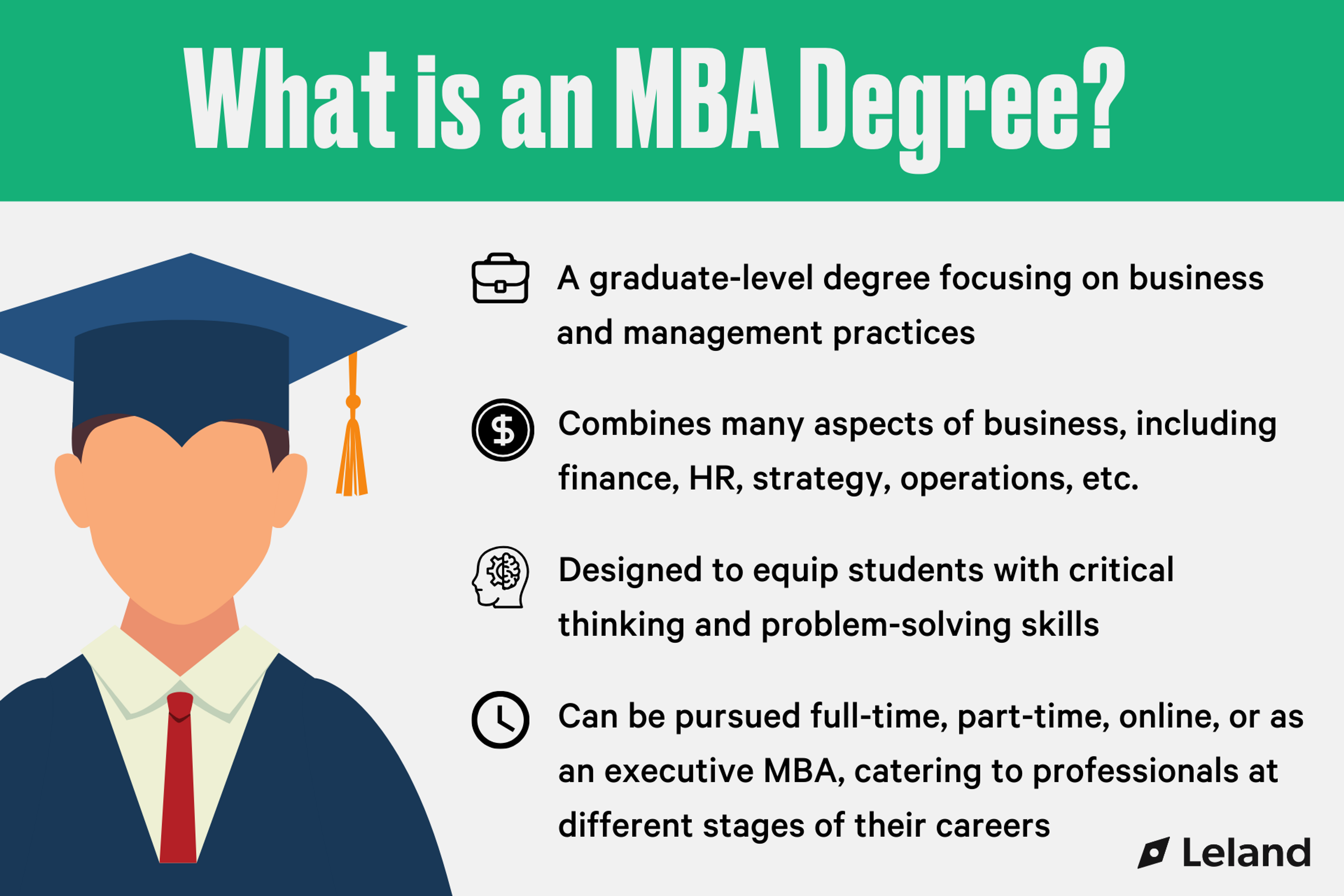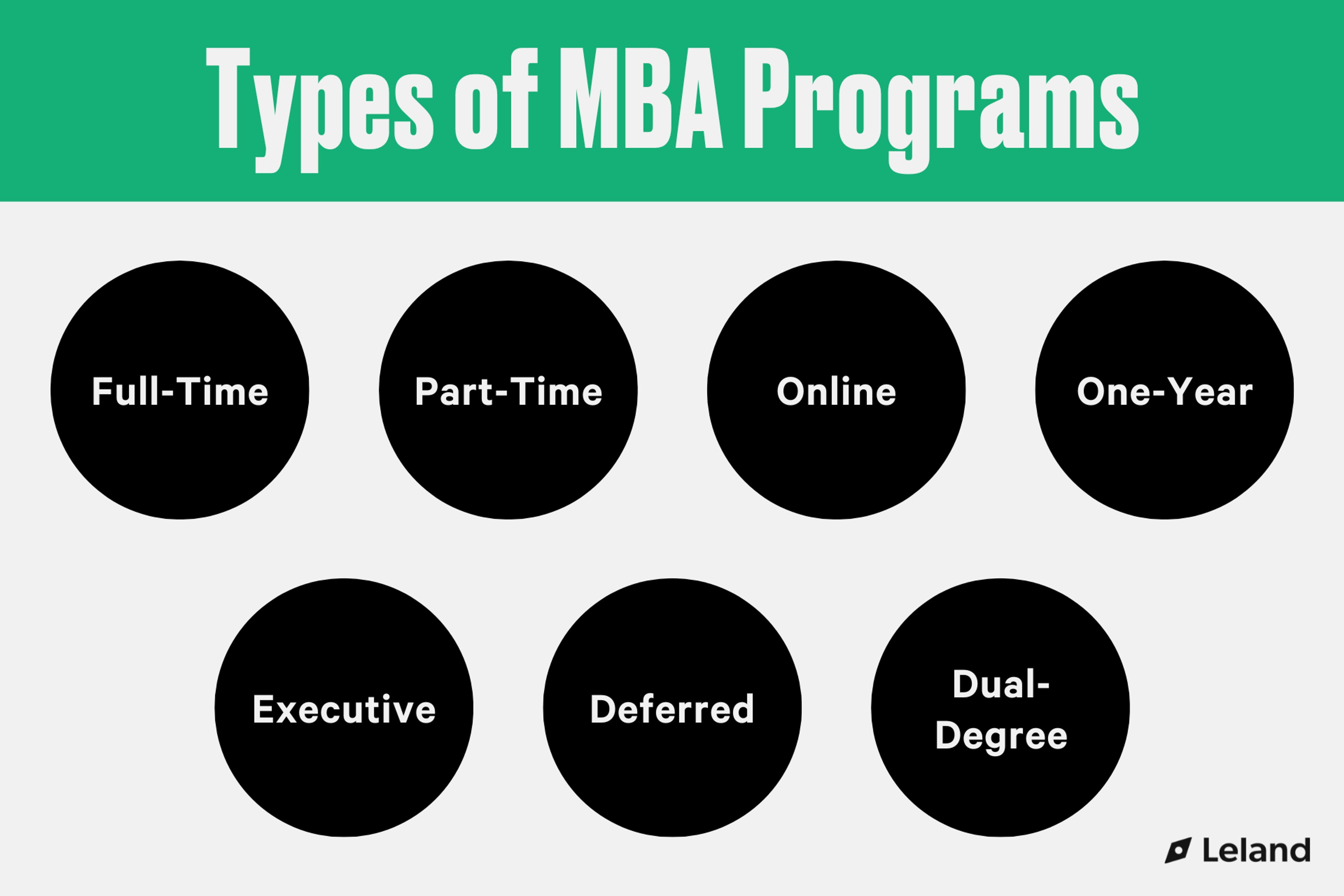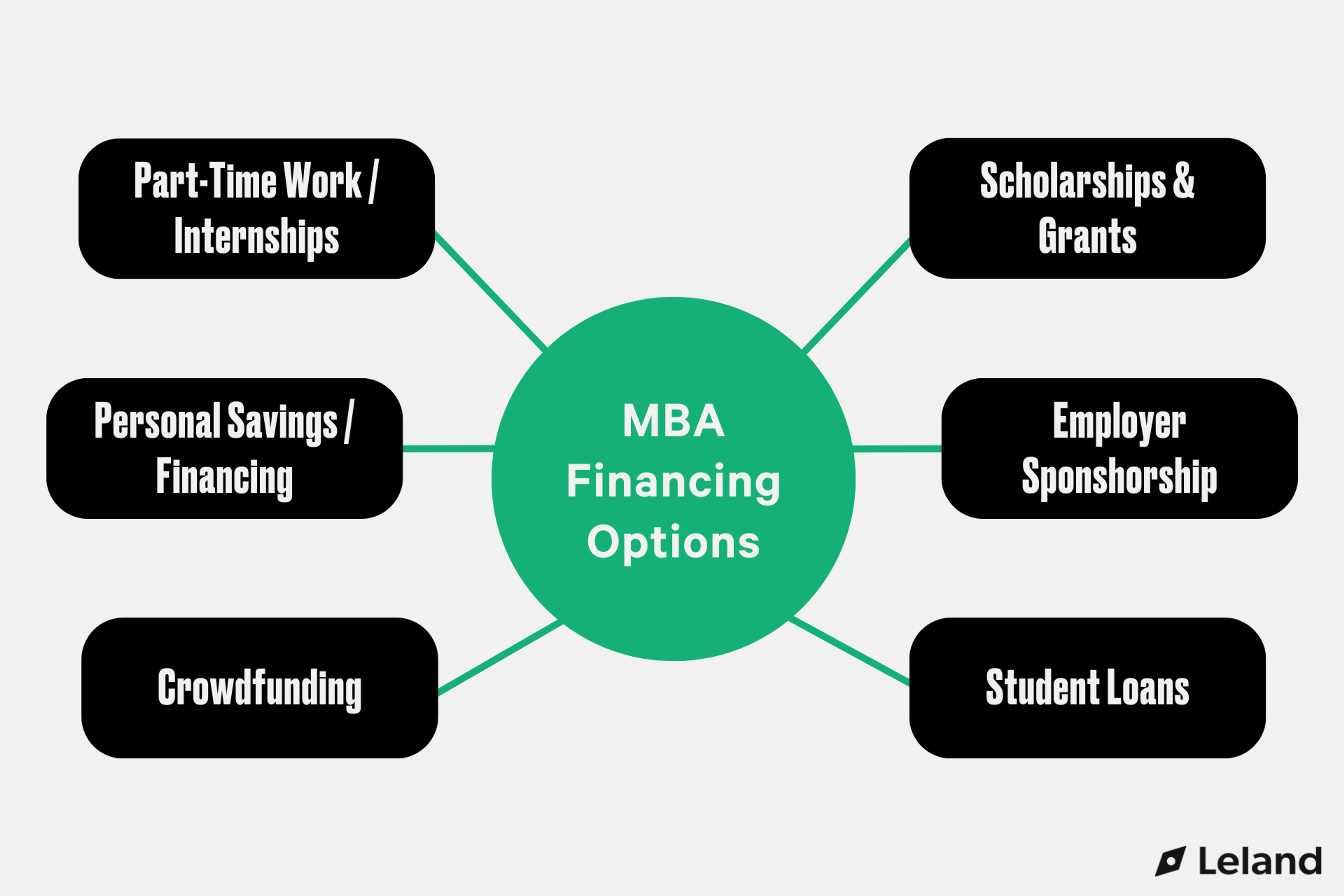What is an MBA Degree? An Expert Guide (2025)
The ultimate guide to MBA degrees, this article covers what an MBA is, the different types of programs, cost breakdown and financing options, curriculum and specializations overview, benefits and key factors to consider, and much more.
Posted July 9, 2025

Table of Contents
For many working professionals, an MBA degree can be the key to leveling up their careers, pivoting into a new industry, or simply gaining a network of people or new skills. At Leland, we support tens of thousands of people with their MBA applications. We have seen over and over how people use MBA programs and apply to business school–this guide will provide insight based on this extensive experience.
What is an MBA Degree?
An MBA degree is a generalized, versatile, and highly regarded graduate degree that helps prepare students for success in many different types of business fields.
MBA programs emphasize both theoretical concepts and practical applications, often helping students land internships during their programs and jobs after graduation. The traditional program is two years, full-time, and in-person with the summer in between dedicated to an internship. Now, many schools offer more flexible degrees including one-year, online, part-time, executive, and joint degree MBA programs.
Business school is typically structured to cover a wide range of disciplines, including finance, marketing, human resources, operations management, and strategic planning, among others. The curriculum is purposefully broad to provide a well-rounded grasp of how businesses actually operate so that graduates can tackle complex business challenges and drive strategic decisions effectively.
An additional feature more distinctive to MBA programs than other graduate degrees is the emphasis on real-world application. Schools offer case studies, group projects, and more to give students practical experience that will serve them well in the rest of their careers. Many programs also offer specializations that allow MBA candidates to tailor their studies to their career interests and deepen their expertise.
What Does “MBA” Stand For?
MBA stands for Master’s of Business Administration. The first MBA program was founded in 1907 by Harvard Business School, then known as the Harvard Graduate School of Business Administration; hence, the inclusion of “Business Administration” in the degree’s title. It had 15 faculty members, 33 regular students, and 47 specialized students.

Who Should Apply for an MBA Degree?
MBA programs typically cater to individuals looking to advance their careers in the business world, whether that’s to climb the ladder in their current role, launch their own ventures, or try something new. Another common motivation is the expansive network that comes with the program. Students have the chance to connect with peers, faculty, alumni, and industry professionals, building relationships that can offer support, mentorship, and career opportunities long after graduation. Though the decision to pursue an MBA degree is a personal one, generally speaking, the people who will benefit the most from it are those who have specific, tangible outcomes in mind.
If you’re considering business school but aren’t sure if it’s right for you, we recommend: When to Get an MBA, When Not To – and How it Affects Your Chances of Getting In
This expert guide will explore the different types of MBA programs, the content covered in a standard MBA curriculum, industry experiences, benefits and factors to consider before applying to a business school, and application requirements.
Types of MBA Programs
Each type of MBA program covers the same foundational topics, but may differ based on time commitments and specializations. The different types of MBA programs include: Full-Time, Part-Time, Online, Executive, One-Year/Accelerated, Deferred, and Joint-Degree.
1. Full-Time MBA
The traditional full-time MBA program is a two-year program designed for people who have already begun their careers and are looking to further their professional prospects. These MBA programs offer hands-on learning and immersive campus experiences, such as networking events, student organization activities, and career fairs. Some business schools also offer accelerated MBA programs, in which students complete their degrees in one year. However, these programs may offer fewer opportunities for hands-on experience or electives.
Full-Time MBA Programs At a Glance
- Length: Two years
- Format: In-person
- Pros: Networking, time for more classes, internships, in-classroom experiences
- Cons: Expensive, time-intensive, limited flexibility
Read: The Top MBA Programs in the US (With Application Deadlines)
2. Part-Time MBA
For working professionals who are committed to their existing careers, a part-time (or online) MBA program may help them balance advancing their education while working full-time. Part-time MBA programs can sometimes take longer to complete, with the average student spending two or more years in business school. Different schools offer different kinds of part-time programs that you’ll want to take into consideration if thinking about a part-time MBA. For example, Chicago Booth offers two different options: an Evening MBA Program or a Weekend MBA Program.
Part-Time MBA Programs At a Glance
- Length: Variable, typically 2.5-3 years
- Format: In-person or online
- Pros: More flexibility and potentially more affordable
- Cons: Less academic involvement, fewer networking opportunities, potentially more stress
Read: The 25 Best Part-Time MBA Programs and Part-Time vs. Full-Time MBA Programs: Pros, Cons, and How to Decide
3. Online MBA
As in the name, online MBA programs offer a digital version of the degree. These programs are typically designed to mirror the curriculum of their on-campus counterparts. They may have the advantage of a more diverse classroom experience because students can log in from anywhere in the world. Online MBA programs are ideal for busy professionals who want to elevate their credentials and learn new skills.
Online MBA Programs: At a Glance
- Length: Typically 2 years
- Format: Online
- Pros: Very flexible, more accessible, global classroom, more affordable
- Cons: No classroom or campus experience, fewer networking opportunities, negative perception from some employers, varied quality
4. Executive MBA
The Executive MBA (EMBA) program, typically a part-time offering, enables candidates to continue full-time employment while pursuing their degree. It is tailored for seasoned professionals boasting extensive work experience (10+ years) and aims to integrate their significant leadership skills within an academic framework. EMBA programs emphasize leveraging industry experience, notably through global cohort study abroad opportunities, enhancing the learning experience with a practical global business perspective. Admission requirements for these programs can vary; alongside the traditional Graduate Management Admission Test (GMAT) and Graduate Record Exam (GRE) scores, some business schools also accept Executive Assessment (EA) scores specifically for EMBA admissions.
Executive MBA Programs: At a Glance
- Length: 1.5-3 years
- Format: Part-time
- Pros: Enhanced leadership skills, flexible scheduling, networking opportunities, continued employment
- Cons: Intense workload and time commitment, often expensive (sometimes more so than traditional programs), limited scope
5. One-Year/Accelerated MBA
One-year MBA programs offer an accelerated path to this degree, condensing the traditional two-year curriculum into a single year. This intensive format is designed for individuals who wish to minimize their time away from the workforce while still gaining the valuable skills and knowledge an MBA provides. Aimed at students with more defined career goals and often requiring a solid foundation in business fundamentals, one-year MBAs are characterized by a rigorous pace of study. These programs typically forgo a summer internship in favor of a continuous study schedule, allowing students to return to their careers or pivot to new roles more quickly. The curriculum is focused, offering depth in specific areas of business alongside core management principles, making it ideal for those looking to enhance their credentials without a prolonged period of study or loss of income.
One-Year MBA Programs: At a Glance
- Length: One year
- Format: In-person (typically)
- Pros: Less time commitment, cost-effective, intensive learning, immediate career impact, less career disruption
- Cons: Rigorous pace, fewer/no internship opportunities, narrower focus, pre-requisite knowledge usually required
Read: The 25 Best 1-Year MBA Programs for 2024
6. Deferred MBA
The Deferred MBA is the newest type of MBA program and offers a unique opportunity for college seniors (or graduate students without full-time work experience) to secure their future in business leadership before graduating. These programs allow candidates to apply and gain admission to an MBA program directly from their degree, with the stipulation that they gain two to five years of professional experience before matriculating. Schools often target high-achieving students who demonstrate significant leadership potential and a clear vision for their career path, offering them the security and foresight of planned advanced education.
Deferred MBA Programs: At a Glance
- Length: 2 years; apply 2-5 years before you matriculate
- Format: In-person, full-time
- Pros: Early admission and a guaranteed spot, reduced pressure, lots of networking opportunities from admission, career clarity
- Cons: Required commitment, potentially less work experience, potential opportunity cost
Read: Top 10 Deferred MBA Programs in the US–and How to Get In and The Deferred MBA Process and Top Programs: An Expert Guide
7. Dual-Degree MBA
Dual-degree MBA programs are structured to provide ambitious students with an opportunity to simultaneously pursue an MBA and another complementary graduate degree, such as a JD (Juris Doctor), MD (Doctor of Medicine), MPP (Master of Public Policy), or MS (Master of Science). These intensive programs are tailored for students looking to blend the rigorous business education of an MBA with specialized knowledge and skills from another field, effectively preparing them for leadership roles at the intersection of these areas. Typically extending over three to four years (or more), dual-degree programs are designed for highly motivated individuals who seek a comprehensive educational experience that transcends traditional academic boundaries, equipping them with a diverse skill set that is highly valued across multiple industries.
Dual-Degree MBA Programs: At a Glance
- Length: Degree-dependent, typically 3+ years
- Format: In-person, full-time
- Pros: Broadened skills/knowledge and industry-specific expertise, diverse career opportunities, expanded network, time/cost efficiency
- Cons: Higher immediate cost, increased workload, career focus dilution, lengthier time commitment
Read: The 5 Most Common MBA Dual-Degree Programs
For specific dual-degree programs, check out:
- The 25 Best JD-MBA Programs for Dual-Degree Applicants
- Top MS/MBA Dual-Degree Programs & How to Get In

Cost of an MBA Degree
The cost of an MBA program will vary broadly depending on the school you choose to attend (its prestige, location, etc.) and the type of program it is. An MBA degree is not cheap, but it is an investment in your future and usually results in a significant pay increase upon graduation.
Cost of Top-Tier MBA Programs
On average, top-tier MBA programs charge $150,000-250,000 for the entire course. This figure covers tuition and fees, but doesn’t take into account other expenses such as books, materials, accommodation, and living expenses, which can add tens of thousands of dollars more to the estimate.
Example: Columbia Business School (per year)
- Tuition: $84,496
- Fees: $5,633
- Health Insurance: $4,541
- Books and Supplies: $320
- Food and Housing: $24,822
- Personal Expenses: $6,246
- Total per Year: $126,058
- 2-Year Estimated Total: $252,116
See the full breakdown here.
Cost of Public & Online MBA Programs
In contrast, more affordable MBA options exist at public universities and through online platforms, where the total expenses might be significantly lower, sometimes as little as $20,000 to $50,000 for the entire program. Fees and other associated costs are also typically much lower, as they don’t always require relocation or new housing and often require fewer supplies. For online and part-time MBA programs, if you remain employed throughout your degree program, you also will not need to pay for health insurance and have income to pay part or all of your degree.
Example: Western Governors University
- Tuition: $9,460
- Books and Fees: $400
- Food: $3,300
- Housing: $4,800 (or whatever you’re currently paying, if doing the online option)
- Expenses: $1,000
- Total per Year: $14,160 (without housing)
- 2-Year Estimated Total: $28,320 (without housing)
See the full breakdown here.
MBA Return on Investment
The return on investment (ROI) for an MBA degree remains a compelling argument for many, with graduates often seeing substantial increases in their post-MBA salaries. However, the financial gains can vary widely by industry, region, and individual career trajectory. To navigate the financial landscape of MBA programs, we encourage researching extensively, considering not only the upfront costs but also the long-term benefits and potential salary uplifts post-graduation for your specific industry and role.
Read: Is an MBA Worth It? Pros, Cons, and How to Decide
How to Pay for Your MBA

Financing options also play a crucial role in this decision-making process. The options available to you will also differ depending on a lot of different factors, including but not limited to the school, type of program, employer, GPA and test scores, current salary, racial/ethnic identity, military status (veteran, active duty), gender, and industry.
Here are some common MBA financing options:
- Scholarships & Grants: Essentially free money that you don't have to repay. Many business schools offer merit-based scholarships, diversity scholarships, and grants aimed at supporting students from various backgrounds and disciplines. External organizations, professional associations, and foundations also provide scholarships targeting MBA students with specific career goals or from particular demographic groups.
- Employer Sponsorship: Some companies offer tuition assistance programs as part of their benefits package, willing to invest in their employees' education in exchange for a commitment to stay with the company for a certain period post-graduation. This win-win scenario can significantly reduce your financial burden while enhancing your skills and value to your employer.
- Student Loans: Federal and private student loans are common funding sources for MBA students. Federal loans often come with lower interest rates and more flexible repayment options compared to private loans. However, they have borrowing limits that may not cover the full cost of an MBA program. Private loans can fill this gap but usually require a thorough evaluation of terms and interest rates to ensure they align with your financial planning.
- Part-Time Work or Internships: Engaging in part-time work or internships related to your field of study can offer a dual benefit: providing income to offset education costs while gaining valuable experience and networking opportunities in your desired industry. Online and part-time MBA programs are particularly conducive to balancing work and study.
- Personal Savings/Financing: Using personal savings or funds from family can be a straightforward way to finance your MBA without the need for loans or scholarships. This option requires advance planning and saving, and is not available to everyone.
- Crowdfunding: A less traditional but increasingly popular method is crowdfunding, where platforms like GoFundMe allow you to raise small amounts of money from a large number of people, often within your personal and professional networks. This approach requires a compelling story and effective marketing but can be a creative way to gather support for your MBA goals.
Read: MBA Scholarships for the Top 10 MBA Programs and 4 Expert Tips on Paying for Business School
MBA Curriculum: What You’ll Learn
As a generalized business degree program, an MBA program covers foundational topics in business administration, which is the process of managing, supervising, and overseeing an organization’s resources (time, money, property, people, etc.).
In a traditional full-time MBA program, students spend their first year completing general education courses such as leadership, economics, marketing, finance, operations management, strategy, and business principles and ethics. The second year, they then spend on elective courses such as financial modeling, real estate, organizational behavior, healthcare management, and private equity to tailor their degree to their areas of interest and career aspirations. Business schools today are also increasingly aware of the role of technology in business, so some may also require introductory data science, quantitative analysis, and statistics courses in their MBA program.
Every school has different core requirements, elective opportunities, and credit distributions. This is definitely something you want to take into account when deciding on the best MBA program for you. We highly recommend reading this article, written by a Stanford GSB MBA and expert admissions coach: Not Every MBA Program is Made Equal–An Overview of the Program Structures of Top Business Schools
MBA Curriculum Example: Stanford GSB
To give you an example of what an MBA curriculum actually looks like, here are the core requirements and sample electives at one of the highest-ranked MBA programs: the Stanford Graduate School of Business
Core Requirements
- Data Analysis and Decision Making
- Leading with Values
- Finance I
- Financial Accounting
- Leadership Laboratory
- Managing Groups and Teams
- Microeconomics
- Optimization and Simulation Modeling
- Organizational Behavior
Distribution Requirements
In addition to the above core requirements, MBA candidates at Stanford GSB must take a certain number of units–and no more than one course–within each of the following areas.
- Finance II
- Human Resource Management
- Information Management
- Macroeconomics
- Managerial Accounting
- Marketing
- Operations
- Strategy
- Strategy Beyond Markets
Electives
GSB offers many different electives across a wide range of subjects. Here are a couple of examples, see here for more.
- Finance
- Corporate Financial Modeling
- Investment Management and Entrepreneurial Finance
- Chief Financial Officer (CFO) Leadership
- Marketing
- Persuasion: Principles & Practice
- Humor: Serious Business
- Consumer Behavior
- Political Economics
- Global Business, Religion, and National Culture
- Managing Politically Conflictual Environments
- Energy: Innovation, Policy, & Business
- Strategic Management
- Systems Leadership
- Startup Garage: Design
- Leading Strategic Change in the Health Care Industry
MBA Specializations
As part of the curriculum, many business schools also allow students to specialize in one or multiple areas of study. Common specializations, sometimes referred to as majors or pathways, include accounting, marketing, operations, private equity, and management, and allow students to tailor their MBA degrees to their professional interests. These focused areas of study also enable students to gain in-depth knowledge and skills pertinent to specific industries, enhancing their expertise and making them highly valuable to potential employers.
For example, finance specializations prepare students for high-stakes decision-making roles, offering insights into investment strategies, corporate finance, and financial markets. Marketing specializations, on the other hand, delve into consumer behavior, digital marketing strategies, and brand management, equipping graduates to lead in dynamic market environments. For those inclined towards innovation and the digital landscape, a specialization in Technology Management can provide a bridge between the technical and managerial aspects of the tech industry. Sustainability specializations are increasingly popular, reflecting a growing demand for leaders who can drive environmental and social responsibility within organizations.
In today’s global economy, Global or International MBA programs are a progressively popular choice among business professionals. A Global or International MBA degree program includes the standard foundational business courses, but has a stronger emphasis on international business operations, cross-cultural communication skills, and global markets and institutions. These programs may also include a language requirement and one or multiple study-abroad opportunities as part of a global immersion requirement.
MBA Specializations of the M7 Business Schools
The M7 business schools include the seven highest-ranked MBA programs: Stanford GSB, Harvard Business School, The Wharton School (University of Pennsylvania), Kellogg (Northwestern University), Chicago Booth, MIT Sloan, and Columbia Business School.
- Accounting
- Business Analytics
- Business Economics and Public Policy
- Business, Energy, Environment and Sustainability
- Diversity, Equity, and Inclusion
- Entrepreneurship and Innovation
- Environmental, Social and Governance Factors for Business
- Finance
- Health Care Management
- Individualized Major: Students can petition for the approval of an individualized major if there is not one that they feel conforms to their interests
- See more here
- Accounting
- Economics
- Finance
- Management Science
- Managing Organizations
- Marketing
- Operations
- Strategy
- These are Kellogg’s majors. They also offer “pathways” for students who want to build expertise in a certain area. See all of the pathways here.
- Accounting
- Analytic Finance
- Behavioral Science
- Business Analytics
- Econometrics and Statistics
- Economics
- Entrepreneurship
- Finance
- General Management
- Healthcare
- International Business
- Marketing Management
- Operations Management
- Strategic Management
- See more here
- Analytics
- Product Management
- Enterprise Management
- Entrepreneurship and Innovation
- Finance
- Healthcare
- Sustainability
- See more here
- Accounting
- Decision, Risk, and Operations
- Economics
- Finance
- Management
- Marketing
- CBS also offers specific centers and programs, in addition to these academic divisions. See more here.
Stanford GSB and HBS do not offer specializations or concentrations, though they have plenty of elective opportunities to choose from.
MBA Industry Experience & Internships
Many business schools also require or highly encourage students to pursue internships in the summer between their first and second years of an MBA program in order to gain more practical, hands-on experience in various industries. The professional network students gain through business school can help them land highly competitive and prestigious internships, which will be key to developing hands-on experience and building their careers after graduation.
Different programs are known for different things and this manifests itself in recruiting. For example, Wharton is known for its prowess in finance. Top finance firms recognize that students looking for internships (and eventually jobs) from Wharton will likely have the necessary skills and networks they need to succeed and will be more comfortable hiring them than, say, a school not known for quantitative strength.
Some MBA degrees also require the completion of a capstone project or case study in the final year of study. For example, Harvard Business School pairs students with companies as part of the required FIELD Global Immersion course, in which students work on a service or product challenge with the company.
A Note on MBA Employment Reports
To make sure that the school you want to apply to will be able to support you in your career goals, we recommend looking at their employment reports. All top programs publish a report each year that outlines where its students found internships and full-time jobs, what they were paid, and more data. Here is an example of the information found in an employment report, taken from Harvard Business School’s Class of 2023.
Harvard Business School: Employment Report (Class of 2023)
- 73% of the class sought employment; of these, 86% received an offer
- Median base salary: $175,000
- Median signing bonus: $30,000 (57% receiving)
- Median performance bonus: $40,000 (70% receiving)
- Top 5 industries
- Consulting: 25%
- Private Equity: 17%
- Technology: 16%
- Investment Management or Hedge Fund: 6%
- Manufacturing: 6%
- Locations: 89% of the class went to the United States, 11% went international
- Northeast US: 54%
- West: 16%
- Southwest: 7%
- South: 5%
See the full HBS Employment Report here.
What are the Benefits of an MBA Degree?
The most attractive benefit of obtaining an MBA degree is inarguably the extensive opportunities available to MBA graduates. Because of the leadership skills and business education developed during their MBA programs, graduates generally go on to work for prestigious companies and hold high-ranking positions. Many top companies only hire MBA graduates for certain roles, so MBA degrees can be a foot in the door for professionals seeking out the most prestigious positions. The professional network available to students both during and after their MBA programs can also help them land competitive internships that lead to return offers and connect with industry leaders and recruiters.
According to the annual Corporate Recruiters Survey by the Graduate Management Admission Council, MBA graduates earn an average starting salary of $115,000 per year, compared to $75,000 for college graduates with no advanced degrees. However, it is important to note that most students already have some prior work experience before beginning an MBA program, which can also influence their starting salaries.
Other Benefits of an MBA
In addition to increased earning potential, MBA programs can offer the following benefits. Whether these benefits are worth the cost and time requirements imposed by the degree depends on your personal circumstances and career goals.
- More career opportunities
- Expanded professional network
- Improved leadership skills
- Global perspective
- Entrepreneurial skills
- Personal development
- Flexibility and adaptability
- Specialization opportunities
- Access to cutting-edge research and thought leadership
Factors to Consider Before Applying
While there are many benefits to obtaining an MBA degree, there are also considerable costs involved for prospective applicants to consider. Full-time MBA programs require students to take time away from their careers and pause their incomes, which can be a significant cost not all applicants can afford. For students who want to continue working full-time, part-time and online MBA programs are an attractive alternative. Many business schools also do not disclose whether a student obtained their MBA degree through a full-time, online, and part-time program on transcripts. However, working full-time in addition to attending school can be mentally exhausting.
The cost of attendance is also an important factor to consider before committing to any MBA program. According to the Education Data Initiative, MBA programs cost upwards of $71,000 per year on average, and students owed an average of $84,000 in 2016, with costs only increasing year after year. Full-time MBA programs at top business schools can be even more expensive, especially after considering housing and other living expenses.
Online and part-time MBA programs are usually more affordable, although some have roughly the same tuition as full-time, in-person programs. Many MBA graduates earn high starting salaries, however, allowing them to quickly pay back any student loans and make up for the costs of attendance, so completing an MBA program is a strong investment in your future.
MBA Admissions Requirements
Applying to business school can be a long and competitive process. Applications to MBA programs generally require:
- Standardized test score (GMAT or GRE)
- Letters of recommendation
- Resume
- Essays
- Undergraduate transcripts
- Interview
Read: The Complete MBA Application Guide
For a completely free, comprehensive, customizable MBA Application Checklist, head here.
According to US News, the top ten business schools’ full-time MBA programs had acceptance rates between 8% and 32% in 2023, so applicants may have to retake the GMAT or GRE multiple times or apply in multiple rounds to get into these MBA programs. Some business schools also offer early acceptance and rolling admissions, and admissions officers still generally recommend applying as early as possible. According to the Graduate Management Admission Council, the number of GMAT examinees has decreased by about 50%, but average scores have increased by 25 points from 2019 to 2023. This suggests that although far fewer prospective students are applying, MBA admissions are still highly competitive.
Most MBA admissions councils encourage students holding a variety of undergraduate degrees to apply, although an undergraduate degree in business, accounting, finance, economics, or a related field can provide students with a solid foundation for business school. An undergraduate degree in a tech-focused field, such as computer science or data science, can also give applicants a leg up in an increasingly digital and analytical world. However, a nontraditional background can also be a strength, as applicants with other degrees can use their unique skills to stand out and demonstrate creative and critical thinking.
Key Takeaways
- Definition and Value of an MBA: An MBA (Master of Business Administration) is a versatile graduate degree designed to prepare students for success across various business fields by blending theoretical knowledge with practical application. Graduates often benefit from improved career opportunities and increased earning potential.
- Types of MBA Programs: MBA programs come in several formats to suit different needs, including full-time, part-time, online, executive, accelerated (one-year), deferred, and dual-degree programs, each offering unique advantages and considerations.
- Curriculum and Specializations: The MBA curriculum covers a broad range of disciplines such as finance, marketing, and strategic planning, with opportunities for specialization in areas like technology management or sustainability, providing students with tailored expertise.
- Admissions and Financing: Admission to MBA programs is competitive, with requirements including GMAT/GRE scores, essays, and interviews. Financing options include scholarships, grants, employer sponsorship, student loans, and personal savings, making advanced planning essential.
- Career Impact and ROI: MBA graduates often see significant returns on their investment through higher salaries, advanced career positions, and an extensive professional network, underscoring the degree's value in the business world.
Thinking About an MBA? We're Here to Help.
If you're considering business school and want guidance on your next steps, you're not alone. At Leland, we've supported thousands of applicants through every part of the process, choosing programs, writing essays, preparing for interviews, and more.
Read these next:
- How to Ace Your MBA Interview: With Prep Questions & Answers
- Top 20 Questions to Ask During Your MBA Application Interview
- The Ultimate M7 MBA Essay Guide
- 7 MBA Essay Tips to Make You Stand Out
- The 10 Best MBA Admissions Consultants
FAQs About the MBA Degree
What does an MBA degree do?
- An MBA (Master of Business Administration) provides both a broad foundation and specialized skills in business. It helps students develop leadership, strategic thinking, and management capabilities across areas like finance, marketing, operations, and entrepreneurship. Graduates often use their MBA to move into leadership roles, switch industries, or launch their own ventures.
Which MBA leads to the highest salary?
- MBA graduates in fields like investment banking, private equity, consulting, and technology tend to earn the highest salaries. Specializations such as finance, strategy, and analytics from top-tier programs (e.g., Harvard, Wharton, Stanford) typically offer the highest post-graduation compensation. However, salary also depends on experience, location, and job role.
Is an MBA the same as a Master’s degree?
- Yes, an MBA is a type of master’s degree, specifically focused on business and management. Unlike academic master's programs (such as an MA or MS), an MBA emphasizes real-world application, leadership development, and preparing professionals for business careers across industries.
Is an MBA higher than a degree?
- An MBA is a graduate-level degree, so it is considered higher than an undergraduate (bachelor’s) degree. It’s on the same academic level as other master’s degrees but is distinct in its focus on professional growth, practical skills, and business leadership.












